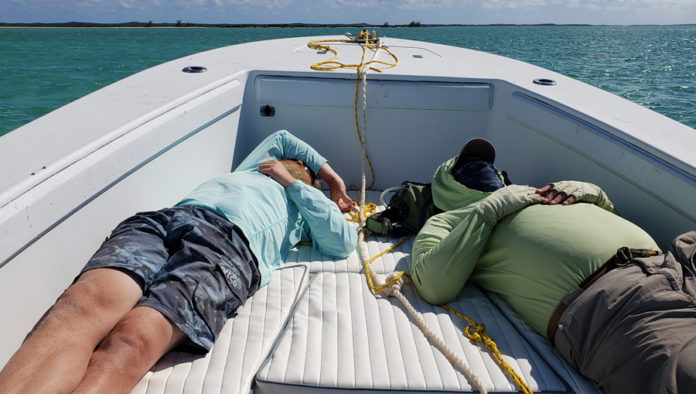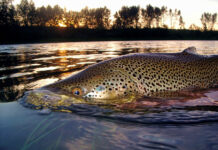Written by: Evan Jones
Photo by Phil Monahan
Whether you’re nymphing a tailwater or stalking a bonefish flat, persistence often pays: making more cast, or taking more steps will eventually result in catching more fish. Knowing this can easily lead to a sense of urgency to do as much as possible during your allotted time on the water. But the quality of each of those casts and steps matters at least as much as their quantities, and since nobody can maintain consistent quality for hours without a break, that means taking timely breaks is every bit as important as persistence. Knowing–and obeying–your limits throughout the day will help to keep you energized and focused, which will lead to better presentations and fewer careless errors.

Photo by Evan Jones
Pacing yourself is particularly important when you’re fishing with a group or a guide, since you’re more likely to skip a desired break in an effort to keep up with the others. You might temporarily avoid a hold-up by soldiering on, but it won’t be long before your fishing begins to slip in quality, which is also detrimental to the group. While you might feel like the weak link requesting a break, it’s far better to address the need as it arises, rather than waiting for it to become a full-blown problem. So don’t be afraid to call for time to rehydrate, snack, or even take a quick nap. Your fellow anglers might put up token resistance, but chances are good they’ll benefit from the break, as well.

Photo by Evan Jones
Breaks serve another crucial purpose beyond rest and re-hydration: they provide precious time to assess and maintain your equipment. It’s all too easy to get caught up in the moment and decide to suffer through a problem rather than stopping to address it. Maybe your tippet has been damaged and needs to be replaced, or there’s a rock in your shoe, or your split shot is too heavy, or your hook point got dulled; the list of potential inconveniences goes on and on. They might seem minor at the time, but every single one of those problems could potentially cost you an opportunity, so they’re all worth addressing immediately as they arise. Losing five minutes of fishing time now is far preferable to losing a fish later on. If you’re already in the habit of taking regular breaks, it’s a lot easier to keep your equipment (and yourself) in prime condition, which will increase your chances of success.
Evan Jones is the assistant editor of the Orvis Fly Fishing blog. He lives in Colorado.
Credit: Source link































